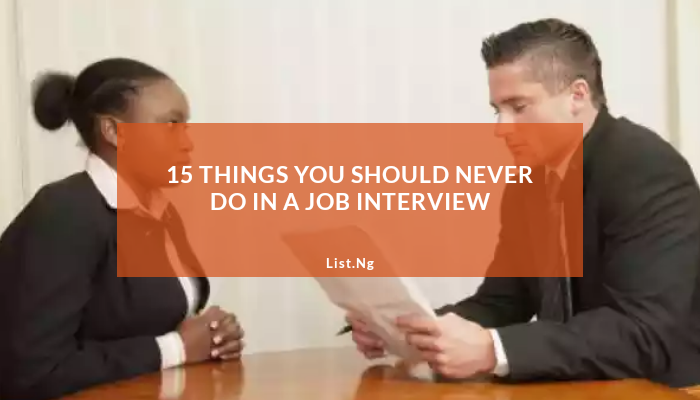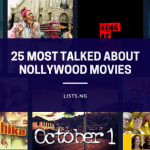Based on popular demand for white collar jobs, a lot of questions are been asked after a fail interview, “What did I do wrong?”.
With so many resources online today (thank you, Internet!), you could probably find a million interview tips out there if you look around long enough.
While we’re not saying that doing any one of these things will automatically disqualify you for a job that you’re interviewing for, what we are saying is simply…don’t.
Employers are evaluating more than your words during the interview process. Your actions and non-verbal expressions tell a lot about your character, and if you aren’t careful, they can send the wrong message to your interviewers.
Review these tips to help you make sure that your actions measure up to your words during the interviewing experience.
15 things you should never do in a job interview
Don’t Show up late
This is kind of a no-brainer but you’d be surprised how often job candidates still show up late and think it’ll go unnoticed. Believe me, your interviewer notices. Even 1 minute passed the agreed-upon time is considered late and the more minutes late, the worse it reflects on you. Showing up late gives the impression that not only do you lack the discipline and professionalism to show up when you say you will, but it also makes your interview(s) wonder if you don’t respect their time and your ability to follow through (as an employee and person).
Don’t Show up too early
Interview lateness is one obvious no-no, but did you know there’s also such a thing as showing up too early? Yes, this concept exists. Unless the company specifically tells you beforehand that it’s okay to show up early, a good rule of thumb is to come in and introduce yourself no earlier than 10 minutes before your interview time. There are a couple of reasons for this: 1) you don’t become an unexpected nuisance if no one is available to greet you or show you where to wait, and 2) it prevents any potential awkwardness, such as running into other interviewees.
Don’t use your cellphone
Nowadays, everyone seems glued to their cellphone…to the point where it’s almost natural for us to check our cellphones at any given time. But in the interview setting using your cellphone can reflect poorly on you, whether you do it in the waiting room or, even worse, in the interview itself. It shows that you lack boundaries and the ability to focus, and might even give the impression that you lack respect for the interview that you’re in and the person interviewing you – none of these things are good!
Don’t look at your watch
Similar to using your phone, looking at your watch during an interview gives negative signals about your ability to focus, your respect for the person interviewing you, and your desire to even be there, especially if you do it multiple times. The only exception for doing this might be if you had a limited window of time for the interview (due to a prior engagement or otherwise) and communicated that to your interviewer beforehand.
Don’t Sit Down Before You’re Invited
Sometimes small courtesies can make a big impression. It’s good business etiquette to not sit down until you’ve been invited or shown to your seat.
Don’t dress inappropriately
There are a lot of schools of thought about what proper interview attire is and it gets even further complicated when different companies today in various industries have their own standards and levels of casualness. Because unlike 10 or so years ago when wearing a suit was considered the ultimate interview uniform, nowadays, some interviewers will actually prefer that candidates NOT wear a suit to their interview. Your best bet is to ask the hiring manager or contact at the company about interview attire as specifically as possible, and avoid the universal no-go’s like wrinkled, hole-y, too-revealing or faded clothing.
Listen Carefully Before Answering
Listening is an underrated interviewing skill. Make sure you know what your interviewer is driving at before you launch into an answer.
Don’t have a negative or defensive attitude
It’s true that the job interview is the time where you should show-off and “prove” your skills and aptitude for the role to the person interviewing you. However, it’s also a very crucial time when the interviewer is also assessing your personality and whether they want to even work with you. This means that it’s in your best interest to not get defensive or negative about anything you’re asked about, even if it’s something from your past that gets you riled up or that you feel needs defending. Instead, practice turning negatives into positives in your interview and demonstrate that you’re a person who thinks and acts positively, even in the face of conflict and difficult topics.
Don’t exhibit distracting body language
This includes things like not making good eye contact, not smiling, fidgeting throughout the interview, crossing your arms, or playing with items – like something on the table, your hair, your clothing, etc. This type of activity is not only distracting in the moment, but it also signals to the interviewer that you might be a distracting or distracted person who’s generally hard to keep focused (which isn’t ideal if they’re trying to maintain productive workplace!) OR that you’ve got something to hide.
Don’t Act desperate
This one might be hard if you actually are desperate for a job, but the point is that by giving your interviewer the impression that you’d do anything for the job at hand or otherwise come off as “reeking of desperation”, the interviewer will question your overall self-confidence and ability to think clearly. After all, the job interview is a chance for you, as a job candidate, to interview THEM to see if they fit your needs just as much as it is a chance for them to interview you; acting desperate just shows that you don’t care whether the opportunity is truly a good a fit and just want them to hire you regardless of any negative outcome – not a good idea.
Don’t Show up unprepared
You should spend as much or more time preparing for an interview as you did preparing for any test you’ve ever taken (more if you never prepped for tests!). Interview preparation includes:
- learning about the company; if it’s online, you should have already read it when you show up for your interview
- anticipating potential interview questions (you can just search online for common interview questions for the role you’re pursuing), preparing responses in advance, and then practicing those responses
- drafting thoughtful questions that demonstrate your interest in the organization and selectiveness when choosing an opportunity
- finding the interview site ahead of time to build confidence and prevent delays
Don’t throw your current or former employer under the bus
Never, never, never throw your current or former employer under the bus during a job interview. Interviewers hear it all the time:
- “Their upper management was the worst. I simply couldn’t work for somebody who I disrespected that much.”
- “The company I was working for was condoning unethical behavior, so I had to seek other employment.”
- “I just didn’t agree with the way they were conducting business there.”
Alarm bells go off the moment you drag an employer’s name through the dirt; the interview team is thinking, “Is this how she’ll talk about us too?”
If asked why you left a certain company or why you’re exploring other opportunities, share honest reasons that don’t bring harm to any person or entity. Great reasons include, “I’m really looking forward to exploring a new industry,” or, “My heart is leading me back to the non-profit industry,” or, “I really miss patient care,” are great responses.
Don’t Skip the Questions
Your interviewer is likely to ask if you have any questions about the role or the company. Don’t be shy; be ready with a set of essential interview questions. Speaking up shows that you’re interested and have been listening.
In our hyper-casual world, paying attention to the details during an interview can help you stand out in all the right ways. Especially for those positions that require interacting with clients or the public, knowing how to navigate a formal interview with grace and refinement is its own unique qualification.
Don’t Mumble
Hold your head up, speak clearly, and make eye contact. Employers shouldn’t have to work to hear you and mumblers don’t come across as capable, confident employees. Remember, good communication is a skill you can learn. If you’ve had trouble in the past, explore ways to speak more effectively.
Don’t ask about salary and benefits too early
You have plenty of time to inquire about salary and benefits…after you receive the job offer. If the interview team is torn between two qualified candidates and you’re the only one who inquired about pay, they might get the impression that the other candidate is more driven by passion and meaningful work while you’re simply seeking a pay check. Those questions are important, but the right time to ask them is when you receive the offer (the answers don’t matter if you never get an offer, after all).
What’s the biggest mistake you’ve made in an interview? If you’ve been on the other side of the desk, what advice do you have for interviewees?






